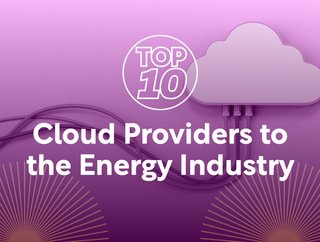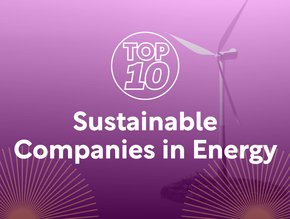Top 10: Cloud Providers to the Energy Industry

As the leading organisations in the digital world, these 10 companies have the capacity to transform the energy sector, too.
Whether it be improving resiliency, efficiency or reputability or helping accelerate the transition to net zero, cloud computing services, technologies and the companies behind them are instrumental to shaping the sector for the better, future-proofing it for generations to come.
Here are just 10 of the world’s leading cloud service providers having a positive influence on their clients across the energy industry.
10. DigitalOcean
Market cap: US$3.39bn
DigitalOcean's data centres are strategically designed for optimal energy usage and adherence to strict environmental policies—also targeting responsible e-waste disposal and recycling. These core values, which align with the goals of the energy industry as a whole, make it one of the leading cloud service providers globally, especially for the energy industry. DigitalOcean plays a key role in promoting a sustainable cloud ecosystem, proving cloud computing can be both powerful and environmentally conscious. It is a provider held in high regard for its simplicity and cost-effectiveness.
9. OVHcloud
Market cap: US$1.93bn
Thanks to its robust security measures, scalable infrastructure and global data centre presence, OVHcloud is a strong choice for the energy industry. As well as this, its commitment to sustainability aligns well with the wider industry's goals, offering a reliable and environmentally responsible cloud platform for digital transformation. For example, EDF Renewables supplies OVHcloud with solar-generated renewable electricity to power a number of its French data centres.
8. Linode
Market cap (Akamai): US$19.35bn
Among the top cloud services providers worldwide, Linode — acquired by Akamai in 2022 — operates one of the largest CDN networks globally, which, for energy clients, means faster and more reliable delivery of content and applications to end-users. Its solutions allow for the delivery of real-time energy consumption data. As an operator itself, the latest figures reveal that 64% of Akamai's connected cloud is powered by clean energy.
7. IBM Cloud
Market cap: US$170.15bn
IBM’s variety of cloud solutions benefit the energy industry. Thanks to its offering across security, data analytics, IoT, hybrid cloud and sustainability, it is well-armed to assist with the unique challenges and requirements of the energy industry. For example, Melbourne Water taps into the power of IoT technology to improve its stormwater management with IBM Maximo. Also in Australia, Downer standardises and centralises its ESG-tracking efforts with automated reporting powered by the IBM Envizi ESG Suite.
6. Alibaba Cloud
Market cap: US$180.04bn
Alibaba Cloud’s Energy Expert pairs AI and innovation to help enterprises move towards a sustainable future. The set of digital tools serves public sectors, enabling them to identify and quantify carbon emissions from their operations and products, while providing cutting-edge analytics on energy efficiency and emission forecasts by leveraging AI models.
5. Oracle Cloud
Market cap: US$320.74bn
Oracle Cloud technology empowers utility companies to accelerate their energy transition to net-zero carbon emissions. Key clients include National Grid, which analyses weather better with Oracle Cloud through machine learning (ML). It prides its solutions for having the ability to reduce the cost and risk of energy change as the industry navigates through its transition to a more renewable future. As a driver of digital solutions, Oracle is pushing how its AI-driven operations and business process automation is driving significant improvements and cost reductions industry-wide. It prides itself on being at the heart of the emerging technologies that are reshaping the industry, accelerating digitisation and promoting decarbonisation.
4. Tencent Cloud
Market cap: US$349.54bn
One of the world's leading cloud companies, Tencent Cloud preferentially builds data centres in regions where green energy is used in a bid to accelerate its commitment to creating innovative solutions to resolve real-world issues and enabling digital transformation for smart industries. When it comes to site selection, Tencent Cloud places a huge premium on choosing localities with abundant renewable and clean energy resources. This is also true for when it comes to supporting the energy sector, which is why Tencent situates itself in regions rich in hydro, wind, biogas, waste-to-energy recovery and other clean energy resources.
3. Amazon Web Services (AWS)
Market cap: US$1.81tr
AWS works with some of the energy sector’s leading organisations, aiding with efforts in transforming, innovating and accelerating their businesses. One of the key areas AWS cloud technology is playing its part is through accelerating the energy transition. Its practical innovations deliver energy efficiently, reliably, sustainably and responsibly. Working with the likes of Baker Hughes, bp, Iberdrola and ENGIE, AWS bills its cloud services as the most advanced and secure across the industry, paired with deep expertise across energy, utilities and sustainable energy sectors. The brand states that its technologies empower energy leaders to improve performance, accelerate innovation, transform the customer experience, maximise safety and security and minimise their carbon footprint.
2. Google Cloud
Market cap: US$1.82tr
Aiding the power and utility industries in digitising their businesses faster, Google Cloud’s range of industry-leading energy-specific solutions, partners and services provides the sector with increased added value. This is accomplished by using its energy expertise and AI leadership to run some of the world’s most energy-efficient data centres, which also helps power companies reach their efficiency goals. For example, Google Cloud joined forces with ENGIE in 2022 to accelerate wind energy development with advanced data management and AI.
1. Microsoft Azure
Market cap: US$3.12tr
Azure offers a combination of scalability, security, analytics capabilities and industry-specific solutions that make it well-suited for the unique challenges and requirements of the energy industry. Azure’s IoT energy management helps energy companies with some of the most important areas like operational profitability, efficiency and resiliency, all while generating value for stakeholders. Namely, this is carried out through technology that optimises grid performance, manages distributed energy resources and implements proactive and predictive maintenance.
*******************
Make sure you check out the latest edition of Energy Digital Magazine and also sign up to our global conference series - Sustainability LIVE 2024.
*******************
Energy Digital is a BizClik brand.






